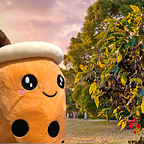There are some days that you’ll never forget. For me, one day stands out in particular.
I was 9, and it was an ordinary lunchtime at school. I have no idea what I was doing then — probably doing the usual Grade 3 things, like hopscotch… or something. Then one of my friends came sprinting at me — and slightly out of breath yelled, “Come here now! We have to go to [the principal’s] office.”
Usually, for a 9-year-old kid, this would be a bit of a stressful situation. For something like this to happen, you’d have to have started a fire with a magnifying glass, strangled a classmate, thrown a chair (like those big swivel-ly office chairs) across the room, or grabbed out a knife at camp and stabbed someone… Basically if you get called into the principal’s office, it was *very* bad.
Luckily for us, it was quite the opposite. It was an invitation to join the school’s robotics team (and without hesitation, everyone sitting at the table accepted). Although, we didn’t quite know what we were in for.
To change a life: give them opportunity.
The team was preparing for FIRST Lego League — a program created by the non-profit organization FIRST — founded by Dean Kamen (inventor of the Segway, among other things) which (according to its website) aims to inspire and engage young people in science, engineering, and technology through exciting mentor-based programs. The organization’s focus is on building STEM skills, fostering innovation, and developing well-rounded life capabilities, such as self-confidence, communication, and leadership, among its participants.
As a 9-year-old, participating in FIRST Lego League was a huge commitment. The program required me to dedicate around 16–20 hours of my week to team meetings, building and programming robots, and preparing for tournaments. This meant that I had to be highly organized* and manage my time effectively in order to balance my other responsibilities, such as schoolwork (not that I had much — but being an Australian school, there was still a workload) and extracurricular activities (flashbacks to piano lessons).
I… did not end up balancing any of those commitments. Just because I had to be organised doesn’t mean I actually was!
Despite the time commitment, participating in FIRST Lego League was an incredibly rewarding experience. Not only did I develop valuable skills in STEM, such as coding and engineering, but I also learned the importance of teamwork, problem-solving, and perseverance. Looking back, I’m grateful for the opportunity to have been a part of such an amazing program, and for the valuable lessons it taught me at a young age.
To change a life: show them the power of their actions.
One of the projects we worked on that season was designing a robotic guinea pig to be used as a substitute in animal-assisted therapy. The impact of our creation was profound, as it helped refugees from war-torn countries cope with PTSD and reintegrate into a new and unfamiliar society.
It was an amazing feeling to know that our hard work and dedication had the power to make a real difference in people’s lives, and we were proud to have contributed to a cause that was so important and meaningful. The experience taught us not only about the power of STEM to make a positive impact, but also about the importance of empathy and compassion in our work.
Many years have passed since 2016, and many team members are now taking on the future as adults… as best they can in this difficult environment. Needless to say, this program has impacted them as much as it has myself — and the millions of people around the world that have completed this challenge.
I cannot stress enough how important this program is, and how so many more children need to be given the opportunity to discover their passion from a young age.
If you’re an educator, I would highly encourage looking into several programs you could run at your school. If you’re a child (you might not be allowed to read this), try convincing your school to do something like this — or look for opportunities elsewhere. Parents, try suggesting a few things for your kid to do — if they like it, that’s great! — and if not, at least they gave it a go.
Find out more at: https://www.firstinspires.org/
This article was written with the assistance of generative AI. This article may not be a reliable source of factual information.
